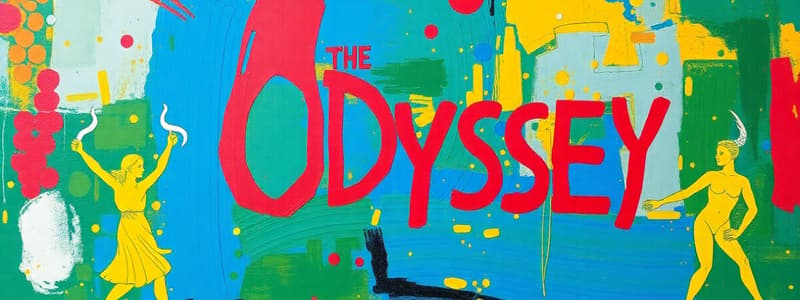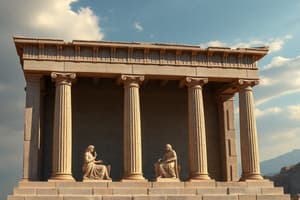Podcast
Questions and Answers
Which of Odysseus' character traits best describes his ability to devise clever strategies, like tricking Polyphemus with the "Nobody" ruse?
Which of Odysseus' character traits best describes his ability to devise clever strategies, like tricking Polyphemus with the "Nobody" ruse?
- Physical Strength and Skill
- Persuasiveness
- Sharp Intellect (correct)
- Commitment to Family and Home
Which of these BEST describes Gilgamesh's transformation throughout the Epic of Gilgamesh?
Which of these BEST describes Gilgamesh's transformation throughout the Epic of Gilgamesh?
- From a peaceful ruler to a ruthless conqueror
- From arrogant and oppressive to wise and reflective (correct)
- From brave and adventurous to cowardly and fearful
- From a humble servant to a powerful king
Which character in The Odyssey is known for their loyalty to Odysseus despite his long absence?
Which character in The Odyssey is known for their loyalty to Odysseus despite his long absence?
- Amphinomus
- Eurymachus
- Antinous
- Penelope (correct)
Which of these is NOT a trait associated with Odysseus?
Which of these is NOT a trait associated with Odysseus?
What is the primary reason Gilgamesh embarks on his quest for immortality?
What is the primary reason Gilgamesh embarks on his quest for immortality?
Which element of narrative structure is BEST demonstrated by Odysseus' confrontation with the suitors?
Which element of narrative structure is BEST demonstrated by Odysseus' confrontation with the suitors?
What is the primary function of the "Exposition" in the structure of a narrative (according to Aristotle's model)?
What is the primary function of the "Exposition" in the structure of a narrative (according to Aristotle's model)?
What does the term 'hubris' refer to in the context of ancient myths?
What does the term 'hubris' refer to in the context of ancient myths?
Which of these is a trait that is MOST LIKELY to be found in both Gilgamesh and Odysseus?
Which of these is a trait that is MOST LIKELY to be found in both Gilgamesh and Odysseus?
Which term describes the concept of guest hospitality in ancient Greece?
Which term describes the concept of guest hospitality in ancient Greece?
What is a characteristic of a hero in ancient myths?
What is a characteristic of a hero in ancient myths?
In a narrative described as 'in media res', where does the story typically start?
In a narrative described as 'in media res', where does the story typically start?
What does 'deus ex machina' refer to in storytelling?
What does 'deus ex machina' refer to in storytelling?
Which part of a metaphor represents the subject of the comparison?
Which part of a metaphor represents the subject of the comparison?
How is physical appearance typically characterized for heroes in ancient myths?
How is physical appearance typically characterized for heroes in ancient myths?
What is a critical skill that heroes often possess according to ancient myths?
What is a critical skill that heroes often possess according to ancient myths?
What does the falling action in a narrative lead to?
What does the falling action in a narrative lead to?
Which of the following best defines 'diction' in drama?
Which of the following best defines 'diction' in drama?
Which of Aristotle's elements deals with the visual presentation of a performance?
Which of Aristotle's elements deals with the visual presentation of a performance?
What is a thesis statement primarily used for in writing?
What is a thesis statement primarily used for in writing?
Which sentence type emphasizes increasing intensity through repetition?
Which sentence type emphasizes increasing intensity through repetition?
What role do subordinating conjunctions play in a thesis statement?
What role do subordinating conjunctions play in a thesis statement?
Which of the following does NOT belong to Aristotle's definition of epic elements?
Which of the following does NOT belong to Aristotle's definition of epic elements?
What is the purpose of a comma in a complex sentence?
What is the purpose of a comma in a complex sentence?
What type of sentence consists of three words that conveys a complete thought?
What type of sentence consists of three words that conveys a complete thought?
What happens to Odysseus after he leaves Calypso’s island?
What happens to Odysseus after he leaves Calypso’s island?
Which event involves Odysseus losing six men?
Which event involves Odysseus losing six men?
What is the consequence of Odysseus blinding Polyphemus?
What is the consequence of Odysseus blinding Polyphemus?
In which situation does Odysseus listen safely while tied up?
In which situation does Odysseus listen safely while tied up?
What significant action does Odysseus take at Circe's island?
What significant action does Odysseus take at Circe's island?
What is the order of events after leaving Calypso's island?
What is the order of events after leaving Calypso's island?
What does Odysseus do during his encounter with the Cyclops?
What does Odysseus do during his encounter with the Cyclops?
Flashcards
Gilgamesh’s Traits
Gilgamesh’s Traits
Characteristics of Gilgamesh include strength, arrogance, bravery, and beauty.
Search for Immortality
Search for Immortality
Gilgamesh seeks to avoid death after his friend Enkidu dies.
Odysseus
Odysseus
Protagonist known for his cunning, bravery, and intelligence.
Telemachus
Telemachus
Signup and view all the flashcards
Exposition in Narrative
Exposition in Narrative
Signup and view all the flashcards
Climax of a Narrative
Climax of a Narrative
Signup and view all the flashcards
Rising Action
Rising Action
Signup and view all the flashcards
Patience and Timing
Patience and Timing
Signup and view all the flashcards
Comparative Sentence
Comparative Sentence
Signup and view all the flashcards
Three Word Sentence
Three Word Sentence
Signup and view all the flashcards
Adverbial Sentence
Adverbial Sentence
Signup and view all the flashcards
Dialogue Sentence
Dialogue Sentence
Signup and view all the flashcards
Odysseus's Departure
Odysseus's Departure
Signup and view all the flashcards
Cicones Encounter
Cicones Encounter
Signup and view all the flashcards
Lotus Eaters
Lotus Eaters
Signup and view all the flashcards
Return to Ithaca
Return to Ithaca
Signup and view all the flashcards
Falling Action
Falling Action
Signup and view all the flashcards
Resolution
Resolution
Signup and view all the flashcards
Plot
Plot
Signup and view all the flashcards
Character
Character
Signup and view all the flashcards
Thesis Statement
Thesis Statement
Signup and view all the flashcards
Subordinating Conjunction
Subordinating Conjunction
Signup and view all the flashcards
Comma Sandwich
Comma Sandwich
Signup and view all the flashcards
More, More, More Sentence
More, More, More Sentence
Signup and view all the flashcards
Myth
Myth
Signup and view all the flashcards
Hubris
Hubris
Signup and view all the flashcards
Xenia
Xenia
Signup and view all the flashcards
In Media Res
In Media Res
Signup and view all the flashcards
Deus Ex Machina
Deus Ex Machina
Signup and view all the flashcards
Epithet
Epithet
Signup and view all the flashcards
Metaphor
Metaphor
Signup and view all the flashcards
Hero Characteristics
Hero Characteristics
Signup and view all the flashcards
Study Notes
Ancient Myths and the Odyssey - Key Terms
- Myth: A traditional story involving gods and supernatural events, often explaining events and ideas.
- Hubris: Excessive arrogance or pride.
- Xenia (Guest Hospitality): Ancient Greek concept of hospitality, including offering food, shelter and protection, and expecting guests to reciprocate with respect and gratitude.
- In Media Res: A narrative that begins in the middle of the action.
- Deus Ex Machina: An unexpected power, event, or character suddenly appearing to resolve a seemingly hopeless situation, often a god in ancient Greek plays.
- Epithet: An adjective or phrase that describes a specific quality of a person or thing, such as "fleet-footed Achilles"
- Metaphor: A comparison between two unlike things, without using "like" or "as", e.g., "Snow is a white blanket covering the earth." A metaphor consists of a tenor (subject), vehicle (comparison), and ground (relationship).
- Tenor: The subject of the metaphor and its intended meaning.
- Vehicle: The source of the comparison or substitution.
- Ground: The relationship between the tenor and vehicle in a metaphor.
- Characteristics of a Hero: Favored by the gods, mortal, physically impressive, skilled at warfare.
Ancient Myths and the Odyssey - Characters and Stories
-
Telemachus: Odysseus' son, who supports him in reclaiming their home.
-
Penelope: Odysseus' wife, who stays loyal to him while he is away.
-
Antinous: An arrogant and disrespectful suitor.
-
Eurymachus: Another disrespectful suitor.
-
Amphinomus: A suitor expressing reluctance.
-
Odysseus: The protagonist, known for his cunning and bravery.
-
Bravery and Courage: Demonstrated in his unwavering determination to overcome dangers.
-
Sharp Intellect: Odysseus' quick thinking and clever strategies, such as his ruse with "Nobody" and use of wine to deceive Polyphemus.
-
Rationality: prioritizing family and home over temptation.
-
Persuasiveness: His ability to influence others with his words.
-
Strategic Mindset: Efficient planning to achieve his goals.
-
Physical Strength and Skill: Combines intellectual abilities with physical prowess.
-
Patience and Timing: Acts at appropriate moments.
-
Commitment to Family and Home: The desire to return to Ithaca and protect his family.
-
Epic of Gilgamesh: Epic featuring Gilgamesh, a powerful and strong king, who is also oppressive, arrogant, and egoistic at the beginning. Brave, beautiful, and searches for immortality after losing his friend. Wise and reflective, learning the value of friendship, leadership, and accepting mortality.
-
Structure of a Narrative (Aristotle): Exposition, rising action, climax, falling action, resolution.
-
Epic Elements (Aristotle's Definition): Plot, character, thought, diction, song, spectacle.
-
Odyssey Summary: Recounting events chronlogically, leaving Calypso's island, arrival at Scheria (encounter with Phaeacians).
Ancient Myths - Other Key Characters/ Stories
- Cicones: Raiding and suffering losses.
- Lotus Eaters: Rescuing crew from forgetfulness,
- Cyclops (Polyphemus): Blinding Polyphemus, invoking Poseidon's curse.
- Aeolus's Bag of Winds: Crew's curiosity causing storm; Aeolus refuses further help.
- Laestrygonians: Cannibal giants destroying most ships.
- Circe: Turns men into pigs; later assists Odysseus.
- Underworld: Tiresias warns of dangers.
- Scylla and Charybdis: Losing men to Scylla while avoiding Charybdis.
- Return to Ogygia: Odysseus stranded with Calypso.
- Return to Ithaca: Odysseus reclaiming his throne, with Phaeacians' assistance.
- Yoruban Creation Myth, Persephone, Zhulong, Gaia, Prometheus, Theseus, Perseus, Daedalus & Icarus, Agamemnon & Achilles, The Muses - Other significant figures and creation stories.
Writing Strategies
- Thesis Statement: A single sentence answering a question, containing two viewpoints, use a conjunction to connect them.
- Subordinating Conjunctions: Create complex sentences linking two ideas based on contrast, cause, condition, time, or purpose. (e.g., Although, because, since, when)
- Comma Sandwich: A sentence with extra descriptive information enclosed between commas.
- More, More, More Sentence: Sentences building on an idea using repetition.
- Three-word Sentence: Conveying a complete thought.
- Sentence beginning with an adverb: adding detail to the action.
- Sentence including speech: Containing dialogue showcasing characters' speech.
Studying That Suits You
Use AI to generate personalized quizzes and flashcards to suit your learning preferences.



